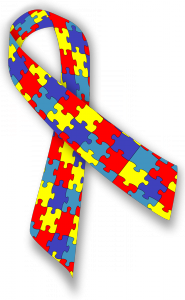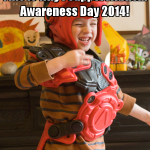
Dr. Sonya Doherty
Dr. Sonya Doherty has very kindly offered us this guest post for our series of autism related posts. The original can be read here.
Dr. Sonya Doherty is a licensed and board certified Naturopathic Doctor who is an active member of the CAND. Sonya Doherty completed her undergraduate training at the University of Western Ontario in a Bachelor of Science Honors Kinesiology program.
She writes
I had the pleasure of meeting Dr. William Shaw a few weeks ago. Dr. Shaw is the Director of Great Plains Laboratory and is the person responsible for first linking abnormal fungal metabolites from yeast overgrowth to Autism Spectrum Disorder. With a background in chemistry and toxicology, he was able to uncover metabolic issues with children on the autism spectrum which can be comprehensively evaluated with the Urinary Organic Acid Test. This urine assessment looks at 72 different organic acids that tell practitioners how the body is working metabolically.
Are there nutrients that are deficient? Is there toxicity? Is there a toxic or metal load that needs to be addressed? Does your child need more antioxidants to protect and heal their brain?
These metabolic abnormalities contribute to language, social and cognitive delay as well as causing many behavioural and physical issues such as self-stimulating behaviour, aggression, irritability, sleeps disturbance, hyperactivity, sensory issues and digestive problems. This test is recommended for every child diagnosed with Autism Spectrum Disorder because it helps identify different strains of yeast as well as elevated clostridia species that have been linked directly to autism and severity of autism. This is the most accurate way to assess intestinal overgrowth of yeast and clostridia.
So, let’s start with yeast. How does yeast overgrowth impact a child with autism, ADHD or other neurodevelopmental disorders?
Check out this link for Symptoms of Yeast Overgrowth.
Yeast depletes B6, CoQ10, alpha lipoic acid and biotin. Let’s look at why these vitamins, and their depletion, are important in autism and ADHD.
- Vitamin B6 is blocked when aldehydes from yeast bind to proteins. B6 is very important because it acts as a co-factor, or helper, in the creation of brain chemicals known as neurotransmitters. Serotonin, dopamine, norepinephrine and GABA are all synthesized using B6 dependent enzymes.
- CoQ10 plays a key role in mitochondrial function. Mitochondria are the tiny organelles in your cells that make energy. It is estimated that 8-20% of autism spectrum disorder can be linked directly to mitochondrial impairment. Recent research has also shown that women exposed to toxicity can pass on mitochondria (children only get mitochondria from their mothers) that are up to 17% damaged. CoQ10 serves as an antioxidant (protector) to all cell membranes.
- Alpha Lipoic Acid is also very important for mitochondrial function. It protects the brain from toxicity and helps to create glutathione which is the body’s master antioxidant. Children with autism were found to have as much as 80% of their glutathione depleted. Glutathione depletion has also been implicated in Parkinson’s and Alzheimer’s Disease. One of the most beneficial effects of alpha lipoic acid is the ability to regenerate other essential antioxidants such as vitamin C, vitamin E,coenzyme Q10, and glutathione.
- Biotin is classified as one of the B vitamins and is needed in the production of DNA. According to Dr. Shaw, biotin is also needed by most other creatures including yeast but when exposed to biotin, they are stimulated to grow but are less likely to convert to their mycelium form, which is the form in which they invade the tissues. Biotin supplementation is required whenever yeast overgrowth is present.
Clostridia
Research by Dr. Sidney Finegold compared the gut flora of children with regressive ASD to neurotypical (typically developing) children. The results show that clostridia counts were higher in the children with autism. The number of clostridia species found in the stools of children with ASD was greater than in the stools of neurotypical children. Children with ASD had 9 species of Clostridium not found in the neurotypical group. The neurotypical group showed only 3 species not found in children with autism. In all, there were 25 different clostridia species found. In stomach and small intestine specimens, the most striking finding was total absence of Clostridia from neurotypical children and significant numbers of such bacteria from children with autism.
These studies demonstrate significant alterations in the upper and lower intestinal flora of children with late-onset ASD and may provide insights into the nature of this disorder.
Research by Dr. Derrick McFabe, at the University of Western Ontario, has explored acquired Clostridia infection and it’s relation to autism spectrum disorder. In his study, rodents injected with propionic acid (from Clostridial species) displayed autism like behaviours including:
- Spinning
- Repetitive behaviours
- Seizures / convulsions
- Pushing away
- Hyperactivity
- Altered social interaction and impairment in “play” like behaviour
Here are some ways that Clostridia could play a role in autism:
- Too much clostridia
- Impaired immune activity
- Damage to digestive tract
- Nutrient deficiencies
- Inflammation
- Diet
Clostrida disrupts metabolic function, which can be picked up in an Organic Acid Test. Clostridia often contributes to carnitine deficiency, increased oxidative stress, depletion of glutathione and microglial activation which increases excitability in the brain = immunoexcitotoxicity.
IMMUNO – immune cells in the brain (microglia)
EXCITO – excited
TOXICITY – too much which causes damage
IMMUNO-EXCITO-TOXICITY – this is the proposed central mechanism for autism } basically this means TOO MUCH GLUTAMATE IN THE BRAIN. Glutamate helps the brain create neurons, but too much causes problems
How does clostridia impair development?
- Carnitine depletion – Acetyl-L-carnitine shuttles essential fatty acids (omega 3 and omega 6) into the cell. Carnitine is essential for language, social and cognitive development. Recent studies have shown that supplementation with carnitine improves autism symptoms, in addition to supporting healthy focus and attention in children with ADHD. Acetyl-L-carnitine is needed to address language deficits in children who have oral motor planning issues or children diagnosed with apraxia / dyspraxia.
- Increases oxidative – oxidative stress occurs in autism. Oxidative stress is caused by other factors such as increase toxic load due to microbes like yeast and clostridia. Oxidative stress can also be caused by viruses, inflammation, nutrient deficiencies or other metabolic abnormalities. Oxidative stress creates free radicals, also referred to as reactive oxygen species. Free radicals cause damage if they are not cleaned up by antioxidants. Oxidative stress damages cell membranes and it also impairs the carnitine shuttle that transports fats into the cell. Stopping the cause of oxidative stress and quenching the reactive oxygen species (ROS) that are created, results in dramatic improvement in developmental skills.
- Glutathione depletion – glutathione is the most important antioxidant in the body. It is made by glutamate, glycine and cysteine. N-acetyl-cysteine, which makes glutathione and also helps mop of excess glutatmate in the brain.
Sonya Doherty, N.D.
FMAPS (Cand.)



